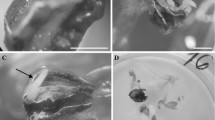Summary
Comparison of different post-plating temperature regimes with a control treatment (27° C) revealed that a short-term cold (8/14°C:2/2 days or 14°C:4 days) as well as a heat treatment (30°C:14 days) increased the production of embryro-like-structures (ELS) from cultured maize anthers. The beneficial effects of short-term cold treatments were magnified 2–3 times when L-proline (PROL) was added to the induction medium (125–500 mg/L). In the best treatment (14°C:4 days, 125 mg/L L-proline) one genotype produced 143.5 ELS/100 anthers. Anthers subjected to high temperature (30°C:4 days, 30°C:7 days, 30°C:14 days) generally showed a lower response than did cold treated anthers, although genotypic differences were observed. Regeneration frequency did not appear to be affected by the presence of L-proline in the induction medium.
Similar content being viewed by others
Abbreviations
- ELS:
-
Embryo-like-structures
- PROL:
-
L-proline
References
Armstrong CL, Green CE (1985) Establishment and maintenance of friable, embryogenic callus and the involvement of L-proline. Planta 164:207–214.
Coumans MP, Sohota S, Swanson EB (1989) Plant development from isolated microspores of Zea mays L. P C R 7:618–621.
Deimling S, Flehinghaus T, Schneider I, Geiger HH (1990) Influence of post-plating temperature and carbohydrate source in maize and rye anther culture. Abstracts VIIth International Congress on Plant Tissue and Cell Culture, Amsterdam, June 24–29: 195.
Dieu P, Beckert M (1986) Further studies of androgenetic embryo production and plant regeneration from in vitro cultured anthers of maize (Zea mays L.). Maydica 31:245–259.
Genovesi AD (1990) Maize (Zea mays L.): In vitro production of haploids. In: Bajaj YPS (ed.) Biotechnology in Agriculture and Forestry 12 — Haploids in crop improvement I. Springer Berlin:176–203.
Ku MK, Cheng WC, Juo LC, Kuan YL, An HP, Huang CH (1978) Induction factors and morpho-cytological characteristics of pollen derived plants in maize (Zea mays L.). In: Proc Symp Plant Tissue Culture 1978, Science Press, Peking:35–42.
Kuo CG, Chen HM, Ma LH (1986) Effect of high temperatures on proline content in tomato buds and leaves. J Amer Soc Hort Sci 11:746–750.
Mutters RG, Ferreira LG, Hall AE (1989) Proline content of the anthers and pollen of heat-tolerant and heat-sensitive cowpea subjected to different temperatures. Crop Sci 29:1497–1500.
Nitsch C (1974) La culture de pollen isolé sur milieu synthétique. C R Acad Sci Paris 278D:1031–1034.
Nitsch C, Andersen S, Godard M, Neuffer MG, Sheridan WF (1982) Production of haploid plants of Zea mays and Pennisetum through androgenesis. In: Earle ED, Demarly Y (eds) Variability in plants regenerated from tissue culture. Praeger, NY:66–91.
Nitsch C, Norreel B (1973) Effect d'un choc thermique sur le pouvoir embryogène du pollen de Datura innoxia cultivè dans l'anthère ouisolé de l'anthère. CR Acad Sci Paris 276D:303–306.
Paleg LG, Douglas TJ, Van Daal A, Keech DB (1981) Proline, betaine and other organic solutes protect enzymes against heat inactivation. Austr J Plant Physiol 8:107–114.
Pescitelli SM, Johnson CD, Petolino JF (1990) Isolated microspore culture of maize: effects of isolation technique, reduced temperature, and sucrose level. Plant Cell Reports 8:628–631.
Schmid IE (1988) Application of gametocides and different chemical agents to anther donor plants and their effects on the induction of androgenesis. Abstracts International Congress Genetic Manipulation in Plant Breeding, Sept 11–16, Helsingor: 80.
Songstad DD, Duncan DR, Widholm IM (1990): Proline and polyamine involvement in chilling tolerance of maize suspension cultures. J Experiment Bot 41:289–294.
Sozinov A, Luksansuks S, Ignatova S (1981) Anther cultivation and induction of haploid plants in Triticale. Z. Pfl.zücht 86:272–285.
Withers LA, King PJ (1979) Proline: a novel cyroprotectant for the freeze preservation of cultured cells of Zea mays L. Plant Physiol. 64:675–678.
Zhang HQ, Croes AF (1983) Protection of pollen germination from adverse temperatures: a possible role of proline. Plant, Cell and Environment 6:471–476.
Zhang HQ, Croes AF, Linskens HF (1982) Proteine synthesis in germinating pollen of Petunia: role of proline. Planta 154:199–203.
Author information
Authors and Affiliations
Additional information
Communicated by A. R. Gould
Rights and permissions
About this article
Cite this article
Büter, B., Schmid, J.E. & Stamp, P. Effects of L-proline and post-plating temperature treatment on Maize (Zea mays L.) anther culture. Plant Cell Reports 10, 325–328 (1991). https://doi.org/10.1007/BF00193151
Received:
Revised:
Issue Date:
DOI: https://doi.org/10.1007/BF00193151




